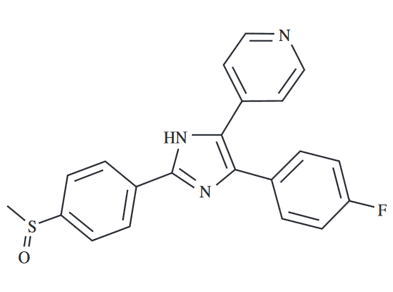SB203580
-
Cat.code:
inh-sb20-5
- Documents
ABOUT
p38 MAP Kinase Inhibitor
SB203580 is a pyridinyl imidazole inhibitor widely used to study the role of p38 mitogen-activated protein (MAP) kinase [1]. The p38 MAP kinase signaling pathway allows cells to interpret a wide range of external signals and respond appropriately by generating a plethora of different biological effects.
Mode of action:
SB203580 inhibits p38 catalytic activity by binding to the ATP binding pocket. It also inhibits the phosphorylation and activation of protein kinase B (PKB, also known as Akt) [2]. Both kinases are involved in a wide array of signaling pathways, including the Toll-like receptor (TLR) signaling pathway [3].
Moreover, several studies suggest that p38 MAPKs regulate distinct phases of autophagy. p38 can elicit autophagy via Beclin-1. Contrarily, p38α has also been reported to inhibit autophagy by interfering with the trafficking of Atg9.
SB203580 is generally used at low concentrations (1-10 μM), as it has been reported that at high concentrations (>20 μM) SB203580 can induce the activation of the serine/threonine kinase Raf-1 [4].
Key features:
- p38 MAP Kinase inhibitor - Autophagy inducer
- InvitroFit™ grade: each lot is highly pure (≥98%) and functionally tested
References:
1. Cuenda A. et al., 1995. SB203580 is a specific inhibitor of a MAP kinase homologue which is stimulated by cellular stresses and interleukin-1. FEBS Lett. 364:229-233.
2. Lali FV. et al., 2000. The pyridinyl imidazole inhibitor SB203580 blocks phosphoinositide-dependent protein kinase activity, protein kinase B phosphorylation, and retinoblastoma hyperphosphorylation in interleukin-2-stimulated T cells independently of p38 mitogen-activated protein kinase. J Biol Chem. 275(10):7395-402.
3. Jarnicki A.G. et al., 2008. Attenuating regulatory T cell induction by TLR agonists through inhibition of p38 MAPK signaling in dendritic cells enhances their efficacy as vaccine adjuvants and cancer immunotherapeutics. J. Immunol., 180: 3797-3806.
4. Kalmes A et al., 1999. Raf-1 is activated by the p38 mitogen-activated protein kinase inhibitor, SB203580. FEBS Lett. 444(1):71-4.
All products are for research use only, and not for human or veterinary use.
InvitroFit™
InvitroFit™ is a high-quality standard specifically adapted for in vitro studies of inhibitors. InvitroFit™ products are highly pure (≥95%) and guaranteed free of bacterial contamination, as confirmed using HEK Blue™ TLR2 and HEK Blue™ TLR4 cellular assays. Each lot is rigorously tested for functional activity using validated (or proprietary) cellular models. This grade ensures reliability and reproducibility for your research applications.
SPECIFICATIONS
Specifications
C6H16FN3OS
50 mg/ml in DMSO
1-10 μM for cell culture assays
Negative (tested using EndotoxDetect™ assay)
In vitro cellular assays
Each lot is functionally tested and validated using cellular assays.
CONTENTS
Contents
-
Product:SB203580
-
Cat code:inh-sb20-5
-
Quantity:5 x 5 mg
SB203580 is provided as a translucent film.
Shipping & Storage
- Shipping method: Room temperature
- -20°C
- Avoid repeated freeze-thaw cycles
- Protect from light
Storage:
Caution:
Details
p38 MAP Kinase
Mitogen-activated protein kinase (MAPK) pathway is an intracellular signal transduction pathway that regulates a plethora of cellular processes, including cell growth, cell proliferation, cell differentiation, stress response, migration, and apoptosis, in response to various extracellular stimuli [1, 2]. It consists of three pathways that involve extracellular-signal-regulated kinase 1 and 2 (ERK1/2), c-Jun N-terminal kinase 1, 2, and 3 (JNK1/2/3), and p38 MAPK signaling pathways [3]. ERK1/2 is activated in response to growth factors, hormones, and proinflammatory stimuli, while JNK1/2/3 and p38 MAPKs are activated by cellular and environmental stresses, in addition to pro-inflammatory stimuli.
p38 MAPKs are responsive to stress stimuli, such as cytokines, ultraviolet irradiation, heat shock, and osmotic shock, and are involved in cell differentiation, apoptosis, and autophagy. Persistent activation of the p38 MAPK pathway in muscle stem cells due to aging impairs muscle regeneration. Of note, four p38 MAP kinases, p38-α (MAPK14), -β (MAPK11), -γ (MAPK12 / ERK6), and -δ (MAPK13 / SAPK4), have been identified.
References:
1. Pua L.J.W. et al., 2022. Functional Roles of JNK and p38 MAPK Signaling in Nasopharyngeal Carcinoma. Int J Mol Sci. 23(3):1108.
2. Cuadrado A. & Nebreda A.R., 2010. Mechanisms and functions of p38 MAPK signalling. Biochem J. 429(3):403-17.
3. Zhang W. & Liu H.T., 2002. MAPK signal pathways in the regulation of cell proliferation in mammalian cells. Cell Res. 12:9–18.

DOCUMENTS
Documents
Technical Data Sheet
Safety Data Sheet
Validation Data Sheet
Certificate of analysis
Need a CoA ?





